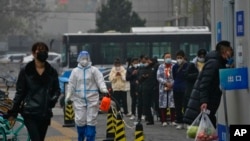The 194 member states of the World Health Organization have been thrashing out a pandemic treaty since Monday aimed at ensuring the flawed response that turned Covid-19 into a global crisis could never happen again.
On the final day of negotiations, they "agreed to develop the first draft of a legally binding agreement designed to protect the world from future pandemics", the WHO said in a statement Wednesday.
"This 'zero draft' of the pandemic accord, rooted in the WHO Constitution, will be discussed" on February 27, 2023, it said.
The announcement came a few days before the third anniversary of Covid-19 emerging in China, before it spread around the world causing the worst pandemic in a century.
The virus has killed 6.6 million people, cost countries trillions of dollars, and laid bare the inequities in access to healthcare and medicine around the world.
The impact of the pandemic "on human lives, economies and societies at large must never be forgotten", said Precious Matsoso of South Africa, a member of a WHO negotiating body that will be working on the draft.
"The best chance we have, today, as a global community, to prevent a repeat of the past is to come together... and develop a global accord that safeguards societies from future pandemic threats."
This conceptual "zero draft" would need to strengthen the preparedness of countries while taking into account issues of equity, she added.
The challenge will ultimately be finding a balance between something bold and with teeth, and something all countries can agree to.
Pamela Hamamoto, the lead US negotiator, said earlier in the week that "there's a lot that needs to change" before the US signs onto the draft.
She said Washington wanted to see transparency fixed into the accord -- such as a promise for swift and comprehensive data-sharing between countries.
The process to reach an agreement was launched at the end of 2021, with plans to adopt a legally binding text by spring of 2024.
WHO Seeks Global Pandemic Treaty

Negotiations on a draft global agreement to better combat the next pandemic will begin in February next year, the WHO announced after three days of discussions in Geneva.
GENEVA —





